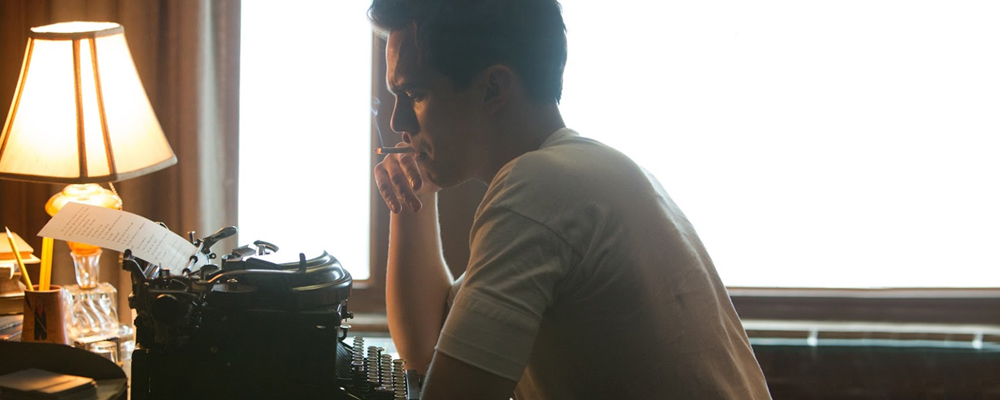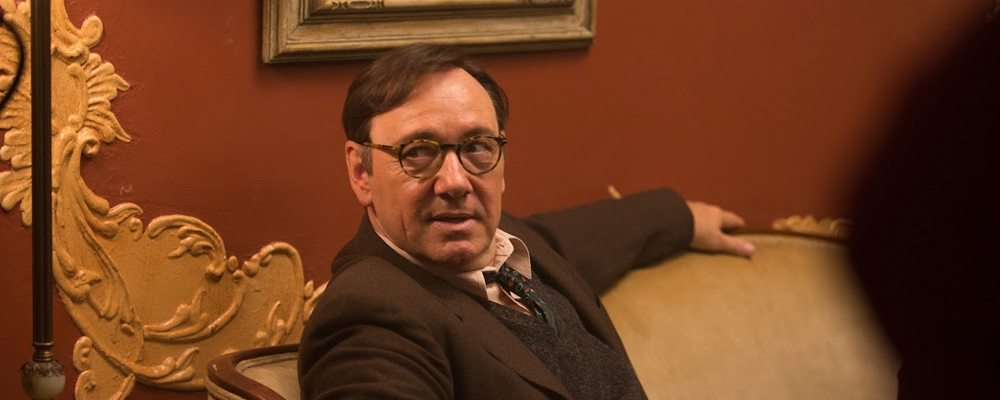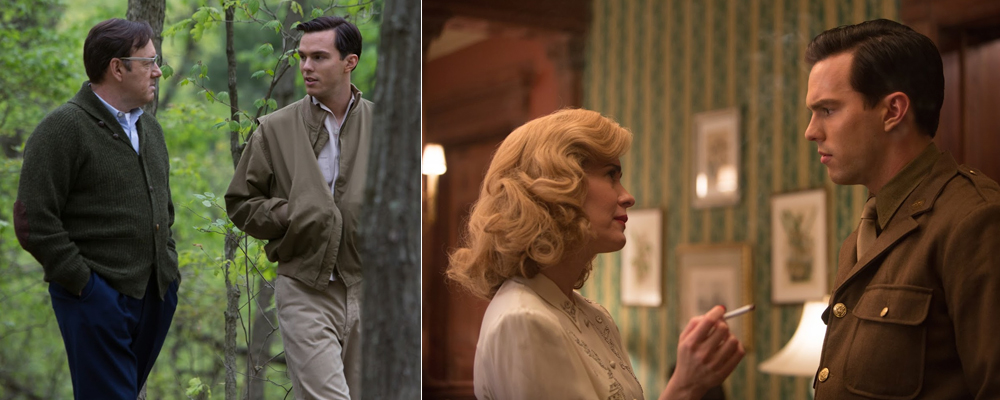‘Rebel in the Rye’ Director Tells Us He Was ‘Blown Away’ by J.D. Salinger’s Life Story
Frederick Mintchell
In “Rebel in the Rye,” the world of legendary writer J.D. Salinger is brought vividly to life for the first time on film. Set amidst the colorful backdrop of mid-20th century New York City, “Rebel in the Rye” follows a young Salinger (Nicholas Hoult) as he struggles to find his voice, pursues a love affair with famed socialite Oona O’Neill (Zoey Deutch), and fights on the frontlines of World War II.
It’s these experiences that will inform the creation of his masterpiece, “The Catcher in the Rye,” bringing him overnight fame and notoriety, and leading him to withdraw from the public eye for the rest of his life. Costarring Kevin Spacey and Sarah Paulson, “Rebel in the Rye” opens a tantalizing window into the life and times of a little-understood genius who broke the rules and redefined American literature.
Though he’s making his directorial debut with the film, Danny Strong is no stranger to Hollywood. Along with winning an Emmy for writing the HBO film, “Game Change,” he was nominated for an Emmy for another HBO film, “Recount.” He also wrote the script for “Lee Daniels’ The Butler” and reteamed with Lee Daniels to co-create the FOX hit, “Empire,” for which he has also written several episodes.
Before he was a successful writer, Strong was an actor whose first credit was in a handful of episodes of “Saved by the Bell: The New Class.” He then became a series regular on not one, but two cult favorites, “Buffy the Vampire Slayer” and “Gilmore Girls.” These were followed by character arcs on some of the most prestigious dramas in recent years, “Mad Men,” “Justified” and “Billions.”
Like any movie-loving kid of a certain age, Strong liked to hang out at his local video store in Manhattan Beach. Strong’s video store clerk was not your typical bored teenager, however. He befriended the store’s movie-loving clerk, Mr. “Pulp Fiction” himself, Quentin Tarantino. Tarantino might have been Strong’s first film “teacher.”
“I was 11 years old. He was my video store clerk and I would spend so much time talking to him that he actually called me “Little Quentin.” I would go and spend an hour at a time hanging out with Quentin. We would talk about movies and he would recommend all these movies. It was a real movie education. It was very memorable for me.”
Though “Buffy the Vampire Slayer” was looked at as a genre show and, thus, overlooked by many critics, even its detractors couldn’t deny that the writing was solid. Before Joss Whedon found himself part of the Marvel universe, he was the creator and writer of the groundbreaking show and had a fan in Strong.
“When you work on a show that’s well-written, it kind of sinks into you a quality or a certain standard that you want in your work. It was great character work, and the way he was able to infuse his voice into the writing in a way that was very insightful and entertaining. I was very influenced by the writing.”
And speaking of writing, why did Strong decide to write a story about the life of one of American literature’s most famous writers?
“I was just blown away by his life story and I was quite moved by it. The fact that in World War II, he was involved in so many of the darkest moments of the war and wrote the book after the war. He was institutionalized. He didn’t write for a while and when he started writing again, the war had transformed his writing. ‘Catcher in the Rye’ was written by a veteran who had suffered trauma in the war. I just thought the story was really profound. I wanted to piece together how this cocky, sarcastic smart ass of New York City ended up living fairly isolated in the woods of New Hampshire.”
Though any writer can relate to another writer’s angst, Strong could not relate to Salinger’s retreat from the public eye.
“I couldn’t do it for a day. I’d be bored out of my mind. I’m an ADD creature of New York City. I love the city and the people and the buildings. I crave that energy.”
Strong could relate, however, to the feelings of rejection any aspiring artist feels, including Salinger himself.
“Absolutely. 1000 percent! Actually, I was reading his biography that I had bought at a bookstore for fun. Then I started feeling connected to the story and thought it could be a movie. I didn’t know anything about him. He was this young man who went to Columbia to study writing and was aggressively seeking a writing career. He was desperately trying to publish and wanted it so bad. He was so ambitious and was getting rejected over and over and over again. He kept at it and kept pushing forward. It reminded me not of myself, but so many friends of mine and what we have had to collectively go through. There was the universal experience of a writer, or anyone seeking a career in the arts – a musician, dancer, actor – of what we all go through. It was like, ‘wow, J.D. Salinger went through what we all went through.’”
Every artist has a story about a particularly humiliating rejection. Strong self-effacingly says that there were too many for any to stand out.
“There are so many that I can’t even begin. As an actor, it’s just endless and as a writer, it’s just endless. My scripts were passed on by every agent and every manager and every production company for years, over and over. I was endlessly passed on.”
After years of rejection, it was especially satisfying for Strong to have his first sold script be such a wild success. “Recount” earned ten Emmy nominations, including a nomination for Strong. It won three Emmys including Outstanding Made for Television Movie.
“‘Recount’ was the first script I was hired to write after I had written many spec scripts over the years that weren’t sold. I sold “Recount” in a pitch to HBO and it went into production. I came up with the idea of a film about the Florida recount and came up with a long 30-minute pitch, which is actually way too long. I found some producers who really liked it, Paula Weinstein and Len Amato, who took it to HBO and they bought it. It’s crazy that they bought it. I look at it as one of the Christmas miracles of my career that HBO bought that pitch in the first place.”
Though he received huge validation when he finally sold a script, relief wasn’t the first emotion he felt.
“When they first bought it, the first thing I felt was pure terror in that I had to write it now and it had to be good. I was literally terrified. There was a moment when it started to go well and I did have a little bit of a smirk in the back of my head for all the agents and managers who passed on me for so many years. And there were a few who passed on me multiple times. It was amazing because I spent so many years as an actor pounding the pavement and being a part of a lot of cool shows, but not really achieving anywhere near what I had hoped as an actor – not even close to be honest with you. Then to have this script that seemed like that last kind of movie Hollywood would make to get awards attention – it was really a pinch me moment.”
It can be scary for a writer to turn a script in without knowing who will play the parts that you’ve grown to love over the course of the project. Strong, though, hasn’t worried too much about who will bring his words to life onscreen.
“I’m usually not scared about it. I’m usually excited about it. I just try to write the parts in a really dynamic way to attract terrific actors. I’ve been really fortunate that all of my movies have had some wonderful actors in them. I’m more focused on how talented of an actor can we get for this part. I’ve ended up with the most amazing slate of actors for these films from Tom Wilkinson [Emmy nominee for “Recount”], Terrence Howard and Taraji P. Henson [“Empire”], Julianne Moore [Emmy winner for “Game Change”], Woody Harrelson [Emmy nominee for “Game Change”], Kevin Spacey. The list just goes on and on.”
Another Hollywood heavyweight Strong wrote for was Jennifer Lawrence when he was the hired hand for “The Hunger Games: Mockingjay Parts 1 & 2.” It’s one thing to write a low-budget movie for an indie studio. It’s another thing entirely to write a big budget sequel.
“It was an interesting job. It was one where the film was very close to the books and they wanted to keep the films very truthful to the books. It was walking a tightrope of staying as close to the book as you can while, at the same time, making it work in film form. There wasn’t a lot of leeway for new material. It was the only thing I co-wrote besides the “Empire” pilot. When you’re working on a massive franchise, it’s not like you’re off working on your own and meditating in the woods and writing what you want. It’s very regimented.”
In a six degrees of Kevin Bacon way – or in a one degree of Jennifer Lawrence way – Strong has directed Lawrence’s “X-Men” co-star Nicholas Hoult in what could possibly be a game changing role for the actor.
“I think he’s amazing in the film. He’s a really talented guy and a wonderful guy too. I think this film shows you what an incredible range he has emotionally on so many different levels. I’m excited for people to see what I think is a tour de force performance.”
“Rebel in the Rye” opens in select theaters Sept. 8.



